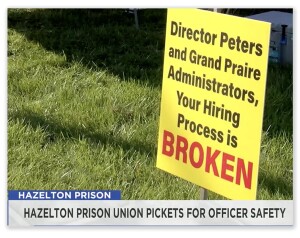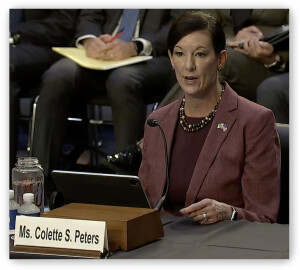We post news and comment on federal criminal justice issues, focused primarily on trial and post-conviction matters, legislative initiatives, and sentencing issues.

IT’S ALL ABOUT THE BENJAMINS
 Bureau of Prison inmates were rocked last week by a systemwide announcement that prisoners with a Second Chance Act (SCA) halfway house placement on or after April 21st would see their placements reduced (but how much is unknown), and any future designation will be limited to a maximum of 60 days. Inmates completing the Residential Drug Abuse Program (RDAP) – who formerly got 180 days in most cases – will now be limited to 125 halfway house days.
Bureau of Prison inmates were rocked last week by a systemwide announcement that prisoners with a Second Chance Act (SCA) halfway house placement on or after April 21st would see their placements reduced (but how much is unknown), and any future designation will be limited to a maximum of 60 days. Inmates completing the Residential Drug Abuse Program (RDAP) – who formerly got 180 days in most cases – will now be limited to 125 halfway house days.
A little background: The Holy Grail for the 94% of federal prisoners who will someday be released is getting to halfway house, a residential facility located in a community setting in which former inmates and recovering substance abusers transition to outside living with regular jobs, banking, family relationships, and the like.
If my unscientific survey of the hundreds of my newsletter readers who have cycled through halfway houses is any indication, halfway house living is fairly miserable. It features an unpleasant mix of all levels of violent and nonviolent state and federal inmates, a staff that is poorly trained compared to Bureau of Prisons personnel, extra layers of bureaucracy, and petty rules enforced with the constant fear of being sent back to a secure institution. Still, for virtually all prisoners, halfway house represents the promise of relative freedom to walk the streets (subject to curfews and severe limitations on where they are going and where they may not tarry), see loved ones, and work in a job where they feel like employees instead of inmates.
One of the first questions a new federal inmate asks is when he or she will be eligible for halfway house placement. Eligible prisoners can earn First Step Act credits for successful programming, with the first 365 credits shortening their sentences by up to a year. Any credits over 365 entitles a prisoner to more halfway house or home confinement time.
Even if prisoners are ineligible for earning FSA credits, the Second Chance Act of 2007—codified in 18 USC 3624(c)—permits (but does not require) the BOP to place any inmate in a halfway house for up to 12 months.
 The BOP has always been focused on placing the inmates at the highest risk of recidivism and with the greatest need for services in halfway house. Contrary to inmates’ prevailing belief, halfway house was never intended to be a reward for good conduct or an accolade for good character, but rather a prerelease tool to increase the chances that the corrections system would never see the prisoner again.
The BOP has always been focused on placing the inmates at the highest risk of recidivism and with the greatest need for services in halfway house. Contrary to inmates’ prevailing belief, halfway house was never intended to be a reward for good conduct or an accolade for good character, but rather a prerelease tool to increase the chances that the corrections system would never see the prisoner again.
The BOP has traditionally employed a five-factor metric to place inmates in halfway house and to determine the duration of their stay. The five-factor review focuses on the resources of the facility, the prisoner’s offense, and the history and characteristics of the offender.
Last fall, the BOP began providing inmates with tally sheets showing them the date they would be eligible for halfway house assuming they earn the maximum number of FSA credits possible for them to get. The sheet also included the convenient but questionable administrative practice of adding the maximum 12 months they could also be granted for halfway house under Second Chance. The listing had an asterisk note warning prisoners that they were not automatically given 12 months, but rather explaining that the number of months of halfway house they would be allocated under SCA would be determined later and only after the individualized five-factor review.
 Hardly anyone reads the fine print, and that applies with extra vigor to prisoners searching for as much hope as they could find. In many minds, 12 months of SCA halfway house on top of all of the FSA halfway house they could earn became an entitlement, not just a possibility.
Hardly anyone reads the fine print, and that applies with extra vigor to prisoners searching for as much hope as they could find. In many minds, 12 months of SCA halfway house on top of all of the FSA halfway house they could earn became an entitlement, not just a possibility.
In crafting the First Step Act, Congress made the policy error of treating halfway house as a reward for successful programming. The more programs completed, coupled with good conduct and a low risk of recidivism, would result in a prisoner earning more halfway house. This turned the BOP’s approach to halfway house on its head: instead of halfway house resources being used for people who needed it most, First Step allocated the resources to people who needed it least.
Money, That’s What I Want: Amidst all of this prerelease fantasy, no one has appreciated the sobering truth behind the COIF numbers. “COIF” – the Cost of Incarceration Fee – is a calculation the BOP publishes annually of how much it costs to keep a federal inmate locked up. In Fiscal Year 2023 – the last year for which COIF data are available –the average COIF for an inmate housed in a BOP prison facility was $120.80 per day. The average FY 2023 COIF for a Federal inmate housed in halfway house was $113.53 per day.
It seems like a no-brainer. It clearly costs less to place a prisoner in a halfway house than to keep him in prison, right?
Maybe but maybe not. The COIF consists of “the obligation encountered in Bureau of Prisons facilities (excluding activation costs)” incurred in keeping an inmate, according to 28 CFR 0.96c. “Obligations” are how much is booked, not how much is actually spent. Right now, for example, the BOP calculates that its facilities repair costs are $3 billion, costs that have not been paid (and may never be paid).
Shaneva D. McReynolds, president of FAMM, said last week, “Prisons come with a menu of fixed costs that do not apply to halfway houses and certainly do not apply to home confinement.” Her point was that the BOP should maximize the number of months and number of inmates in halfway house, but her point disproves her position.
Fixed costs, by definition, do not increase according to inmate count. In other words, if $100.00 of the prison COIF represents fixed costs and $21.00 represents marginal costs, then sending a prisoner to halfway house only saves the BOP $21.00 while costing it about $114.00 in contract fees to the halfway house. Net loss to the BOP: about $93.00 a day per prisoner placed in halfway house. The prison is still there, the light bill still has to be paid, staff still has to be paid, the roof still needs to be fixed.
 No one doubts that the BOP is bleeding cash. The agency currently has nearly 6,000 fewer employees than needed, a shortfall costing over $437 million in overtime charges, BOP associate deputy director Kathleen Toomey told Congress in February 2025. A third of the FY 2023 overtime went for almost 76,000 outside medical trips and 84,000 hospitalizations.
No one doubts that the BOP is bleeding cash. The agency currently has nearly 6,000 fewer employees than needed, a shortfall costing over $437 million in overtime charges, BOP associate deputy director Kathleen Toomey told Congress in February 2025. A third of the FY 2023 overtime went for almost 76,000 outside medical trips and 84,000 hospitalizations.
Prison consultants Dr. Susan Giddings and Bruce Cameron wrote last week that halfway house placement “is actually more expensive than the cost of incarceration in a minimum-security prison and, in many cases, a low-security prison as well.” They said,
It’s too late for this fiscal year. The damage is done, and all the Bureau can do is stop the hemorrhaging. But if President Trump and Congress act now, fiscal year 2026 could be turned around. Home Confinement placement is significantly less costly than halfway house or incarceration, but in order to take advantage of the savings and better use the residential halfway house resources more efficiently, the status quo is not the answer. It’s time to flip the table and get something done.
Phillip Nunes, executive director of the Eastern Ohio Correction Center and president of the International Community Justice Association, told prison consultant Walter Pavlo that halfway houses currently have capacity and could expand without needing new contracts with the BOP.
Former BOP Acting Director Hugh Hurwitz said the same in the Atlanta Journal-Constitution last December. Hurwitz told prison consultant Walter Pavlo last week that the proposed 60-day limit is insufficient for inmates – particularly those who have served long sentences – to make the adjustment to the street.

While Giddings asserts that halfway house costs more than imprisonment – which, because the prison costs include fixed and marginal costs alike while halfway house is all marginal dollars – Pavlo disputes the claim: “It is difficult to see how the BOP’s decision to limit halfway houses is going to end up saving any money. In fact, both the First Step Act and the Second Chance Act, both heavily reliant on halfway house placement, were passed by Congress overwhelmingly on the assumption that they would save money on the costs of incarceration.”
The Sobering Reality: Giddings and Cameron said that while the BOP announcement cutting halfway house placement was “devastating” for many prisoners and their families,” it is unsurprising:
The Bureau has had to prioritize lengthy First Step Act (FSA) prerelease placements over SCA placements for months. These lengthy FSA placements, anywhere from 12 to 26 months in length, tie up halfway house and home confinement resources for well beyond the average four- to five-month placement. The issue was further exacerbated by the previous Administration’s refusal to support the Bureau in court challenges regarding whether the Bureau had any discretion in these designation decisions to include cases where the individual presented public safety risks. The Bureau was told the only consideration was the time credits: nothing else mattered.
The BOP has argued in court that it is not required to honor FSA credits for halfway house, but it has lost that fight. So how do you pay a big new bill required by law from a budget that is already under intense pressure? Answer – you stop spending on any part of the budget over which you have control.
One inmate told me that at her facility, “Girls were devastated. Screaming, crying, shutting down, signing out of RDAP.” Another prisoner demanded to know whether it was true that “Trump passed a new law to where federal inmates can only get 60 days of halfway house now a that you can’t get up to 6 months anymore?”
Of course, Trump had nothing directly to do with this. As far as implementing the SCA, nothing in that law required the BOP to give prisoners any halfway house time. Whether there is a solid legal challenge to last week’s decision has yet to be seen.
Race to the Courthouse: If my email can be believed—and I got a lot of email on the subject—inmates are now filing a blizzard of suits challenging the BOP action. The cottage industry of people who provide litigation support services to federal prisoners is leading the charge.
 One newsletter reportedly told inmate readers that the matter could be challenged using the same theory that won in Rodriguez v. Smith, a 2008 9th Circuit decision. A more careful review of Rodriguez would have shown even a casual reader that several decisions since then—such as Hindman v. Inch—have held that the Rodriguez holding was superseded by the SCA and has been reduced to a historical curiosity.
One newsletter reportedly told inmate readers that the matter could be challenged using the same theory that won in Rodriguez v. Smith, a 2008 9th Circuit decision. A more careful review of Rodriguez would have shown even a casual reader that several decisions since then—such as Hindman v. Inch—have held that the Rodriguez holding was superseded by the SCA and has been reduced to a historical curiosity.
Another prisoner complained to me that the BOP “wants to keep us in prison longer, which means spending more money to keep us locked up. Then they don’t want to implement the Second Chance Act, which is law. We can’t break the law, but they clearly can by not implementing the Second Chance Act.”
Blame First Step for encouraging the belief that halfway house is an entitlement and blame the BOP’s administrative laziness for convincing prisoners and their families that a full year in halfway house was a given.
As for the BOP’s intentions, it’s not about keeping people in prison longer. It’s all about the Benjamins, baby.
Giddings and Cameron, The Bureau Takes Additional Drastic Actions to Contain Costs as They Struggle with Budget Issues (April 1, 2025)
Cost of Incarceration Fee, 89 FR 97072 (December 6, 2024)
Forbes, Bureau of Prisons Is A “Powder Keg” With Problems (April 4, 2025)
Forbes, Under Budget Pressure, Bureau Of Prisons To Cut Halfway House Time (April 1, 2025)
Atlanta Journal-Constitution, The Bureau of Prisons has plenty of open beds for reentry (December 6, 2024)
Rodriguez v. Smith, 541 F.3d 1180 (9th Cir. 2008)
Hindman v. Inch, Case No 2:17-cv-00323, 2018 U.S. Dist. LEXIS 46834 (S.D.Ind., March 22, 2018)
– Thomas L. Root


 Back in early 2022, William Maxwell filed a petition for habeas corpus under 28 USC § 2241, arguing that the BOP had failed to consider him for priority transfer to home confinement under the CARES Act. He threw in a Festivus of other grievances as well – the BOP had treated him differently than other people (naming specifically Michael Cohen and Paul Manafort), it had denied him time credits, denied him extra minutes for phone use, refused him expanded commissary spending limits, denied him transfer to a halfway house, refused him preferential housing at privilege, and withheld other privileges he said the First Step Act provided him.
Back in early 2022, William Maxwell filed a petition for habeas corpus under 28 USC § 2241, arguing that the BOP had failed to consider him for priority transfer to home confinement under the CARES Act. He threw in a Festivus of other grievances as well – the BOP had treated him differently than other people (naming specifically Michael Cohen and Paul Manafort), it had denied him time credits, denied him extra minutes for phone use, refused him expanded commissary spending limits, denied him transfer to a halfway house, refused him preferential housing at privilege, and withheld other privileges he said the First Step Act provided him. The holding underscores the need to pay attention to procedure. Bill had spent over three years to end up right where he started, needing to exhaust remedies for a non-2241 civil action.
The holding underscores the need to pay attention to procedure. Bill had spent over three years to end up right where he started, needing to exhaust remedies for a non-2241 civil action.





























